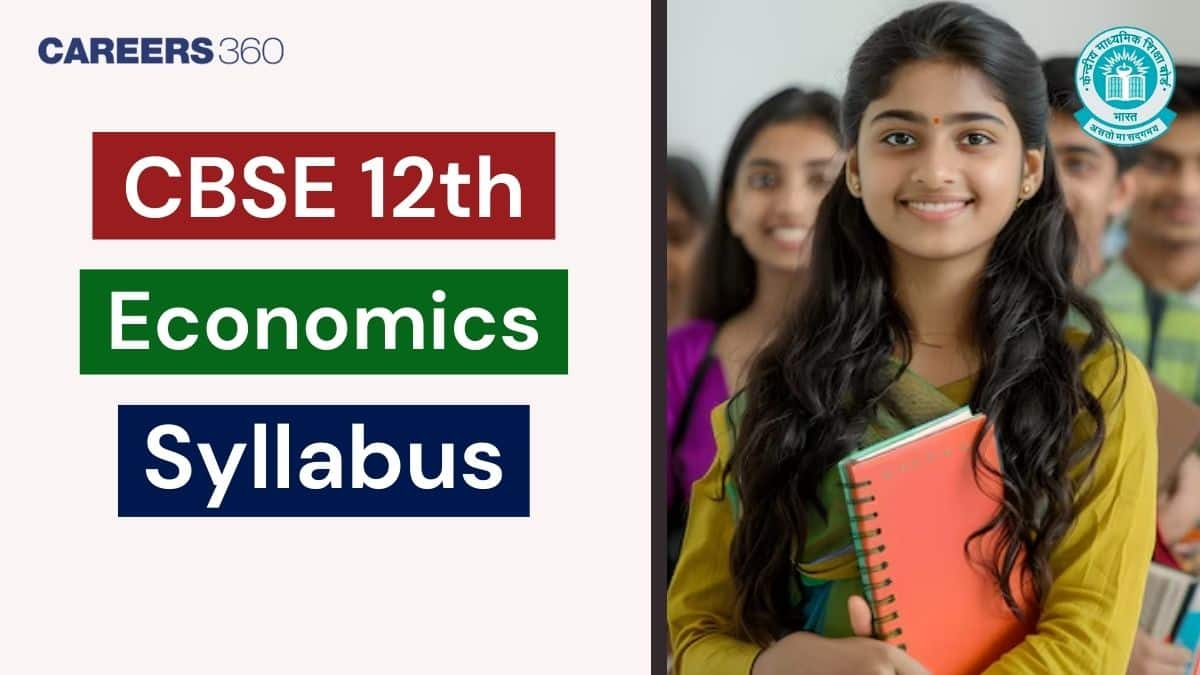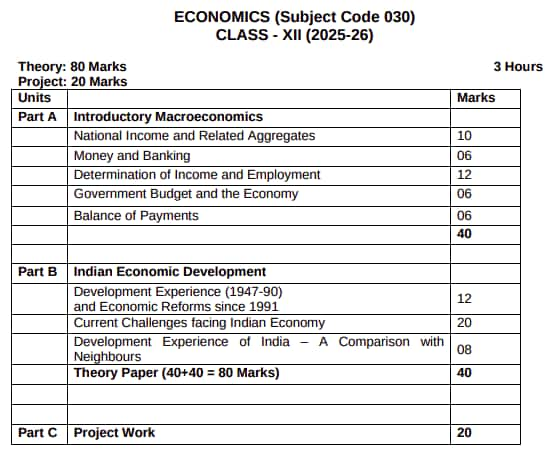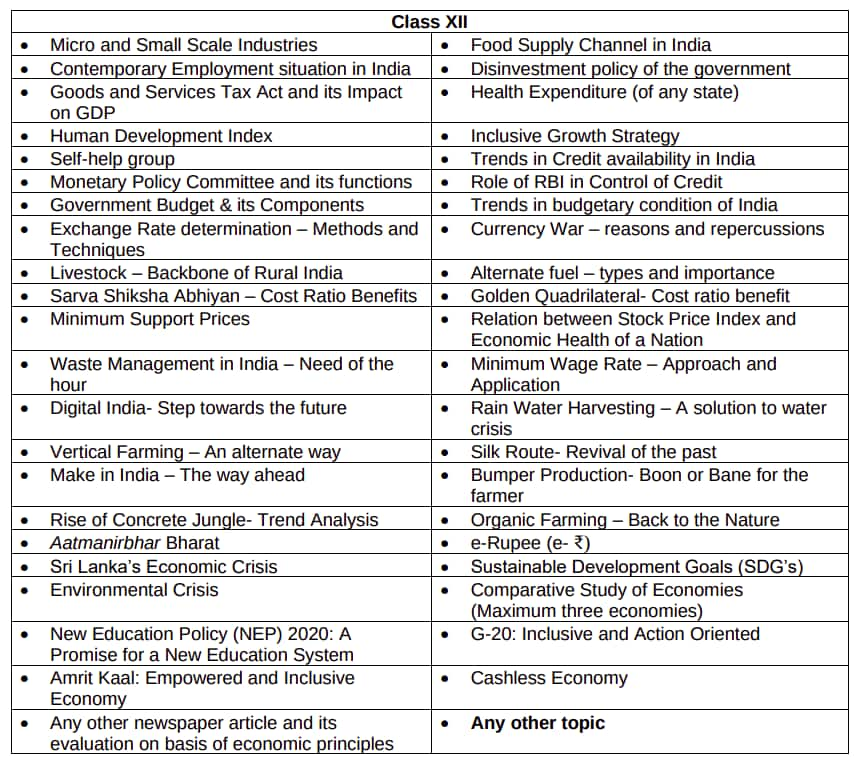CBSE Class 12 Economics Syllabus 2025-26 Download Free PDF | Macroeconomics & Indian Economy
CBSE Class 12 Economics Syllabus 2025-26 - The Central Board of Secondary Education released the latest CBSE syllabus of Economics Class 12. The CBSE Class 12 Economics syllabus 2025-26 is available on cbseacademic.nic.in. The CBSE board has divided the entire syllabus into two parts: Part A (Introductory Macroeconomics) and Part B (Indian Economic Development). All the topics of the economics syllabus class 12 CBSE are important for board exams.
Download: CBSE Class 12 Economics Syllabus 2025-26 PDF
This Story also Contains
- How to Download CBSE Class 12 Economics Syllabus 2025-26?
- CBSE Class 12 Economics Syllabus 2025-26
- CBSE Class 12 Preparation Tips

Students should refer to the Economics class 12 CBSE syllabus to prepare for the CBSE 12th exams. Topic-wise weightage of marks is also mentioned in the Economics syllabus of class 12 CBSE. Students can find an overview and detailed CBSE Class 12 Economics syllabus in this article, along with a download link to the CBSE Economics syllabus 12th Class. Students should check each topic and understand the concepts better to score good marks in the final exams. Read further to know in detail the complete CBSE Class 12 Economics syllabus 2025-26.
Other subject syllabus
How to Download CBSE Class 12 Economics Syllabus 2025-26?
Students can download the economics syllabus for class 12 for the CBSE board exam to prepare better. Go through the steps given below to download the Class 12 CBSE Economics syllabus 2025-26:
- Step 1: Visit the official website at cbseacademic.nic.in.
- Step 2: Click on the “Academic Website” on the homepage.
- Step 3: Click on the “Curriculum” from the list of options mentioned in the menu bar.
- Step 4: Select the “Curriculum 2025-26” from the dropdown menu.
- Step 5: Click on the “Senior Secondary Curriculum” link for the Class 12 syllabus.
- Step 6: Select the “Academic Subjects” link to download the Economics syllabus PDF.
- Step 7: Download the CBSE 12th Economics syllabus for 2025-26 for future reference.
CBSE Class 12 Economics Syllabus 2025-26
Students can check the prescribed Economics syllabus of class 12 CBSE in the image given below. The CBSE 12th Economics syllabus is divided into 2 parts. Part A consists of Macroeconomics, and Part B consists of Indian Economic Development. Students must note that the theory paper will have a weightage of 80 marks, while 20 marks are reserved for the project work. To understand better, students should thoroughly understand the syllabus of the Economics class 12 CBSE 2025-26. Check the image given below to get an overview of the CBSE class 12 Economics syllabus 2025-26.
Overview of CBSE Class 12 Economics Syllabus 2025-26

Detailed CBSE Class 12 Economics Syllabus 2025-26
The entire CBSE Economics class 12 syllabus is designed to be covered in approximately 200 periods. The written exam will carry a weightage of 80 marks, and 20 marks are allotted for the project work. Check the chapter-wise detailed CBSE Economics class 12 syllabus in the following tables:
Part A - Introductory Macroeconomics Syllabus
Unit-name | Chapters and Topics |
Unit 1: National Income and Related Aggregates |
|
Unit 2: Money and Banking |
|
Unit 3: Determination of Income and Employment |
|
Unit 4: Government Budget and the Economy |
|
Unit 5: Balance of Payments |
|
Part B: Indian Economic Development
Unit name | Chapters and Topics |
Unit 6 - Development Experience (1947-90) and Economic Reforms since 1991 |
|
Unit 7 - Current challenges facing the Indian Economy |
|
Unit 8: Development Experience in India |
|
Prescribed Books for CBSE Class 12 Economics Syllabus 2025-26
Below are some of the best books for the 12th economics syllabus for the CBSE exam. Check them out.
- Statistics for Economics, NCERT
- Indian Economic Development, NCERT
- Introductory Microeconomics, NCERT
- Macroeconomics, NCERT
- Supplementary Reading Material in Economics, CBSE
CBSE Class 12 Economics Project Topics

CBSE Class 12 Preparation Tips
- First of all, make a proper timetable to study, which includes all the subjects. Also, include some time for interests and hobbies to keep the mind fresh.
- Go through the CBSE 12th date sheet and try to cover the entire 12th CBSE Economics syllabus two months before the exams. In such a way, students will have enough time to revise the CBSE Class 12 Economics syllabus 2025-26.
- Grasp all the concepts from the NCERT books or prescribed books in the beginning, then move on to other reference books for economics.
- Clear all the doubts from teachers or friends and make notes on important topics of the CBSE class 12 Economics syllabus 2025-26.
- These notes will help to revise the entire CBSE 12th Economics syllabus in a short time.
- Solve CBSE class 12 question papers of previous years to get acquainted with the typology of questions that are asked in the exam.
- Analyse the preparation level by evaluating the performance in solving the question papers and improving mistakes by identifying them.
- Following this CBSE Class 12 Economics syllabus 2025-26 and preparation tips will aid students to improve their CBSE 12th result.
Related Links:
Frequently Asked Questions (FAQs)
Development Experience, Money and Banking, National Income and Related Aggregates, and others are some of the important chapters and topics which needs to be covered for exams.
- Statistics for Economics, NCERT
- Indian Economic Development, NCERT
- Introductory Microeconomics, NCERT
- Macroeconomics, NCERT
- Supplementary Reading Material in Economics, CBSE
CBSE Class 12 Economics syllabus 2025-26 is divided into the following two parts:
- Part A - Introductory Macroeconomics Syllabus
- Part B - Indian Economic Development Syllabus
Class 12 Economics question paper is prepared by the board as per the prescribed CBSE Class 12 Economics syllabus 2025-26.
Yes, it is essential to submit project work else students do not qualify in project work assessment.
A total of 200 periods are required to cover the CBSE 12th economics syllabus.
Questions related to CBSE Class 10th
On Question asked by student community
The CBSE Board Exam Class 10 English Question Paper can be downloaded in PDF format here .
Students can download the CBSE 10th Maths question paper from below.
Download CBSE Class 10 Maths Question Paper Here
The CBSE 10th maths exam follows the 80 (Theory) + 20 (Internal) format.
-
Question 1 (8 Marks):
-
(A) 4 MCQs (1 mark each).
-
(B) 4 Very Short Answer questions (1 mark
-
You can check the SST 2026 question paper here .
Hi Student
Check out the link below to get the Central Board of Secondary Education question paper 2026 Class 10 for all subjects.
Hi,
Please open the link below to find the CBSE Class 10th Maths 2026 question papers and answer key - https://school.careers360.com/boards/cbse/cbse-class-10-maths-question-paper-2026
https://school.careers360.com/boards/cbse/cbse-10th-maths-answer-key-2026
Applications for Admissions are open.
As per latest syllabus. Physics formulas, equations, & laws of class 11 & 12th chapters
JEE Main Important Chemistry formulas
Get nowAs per latest syllabus. Chemistry formulas, equations, & laws of class 11 & 12th chapters
JEE Main high scoring chapters and topics
Get nowAs per latest 2024 syllabus. Study 40% syllabus and score upto 100% marks in JEE
JEE Main Important Mathematics Formulas
Get nowAs per latest syllabus. Maths formulas, equations, & theorems of class 11 & 12th chapters
